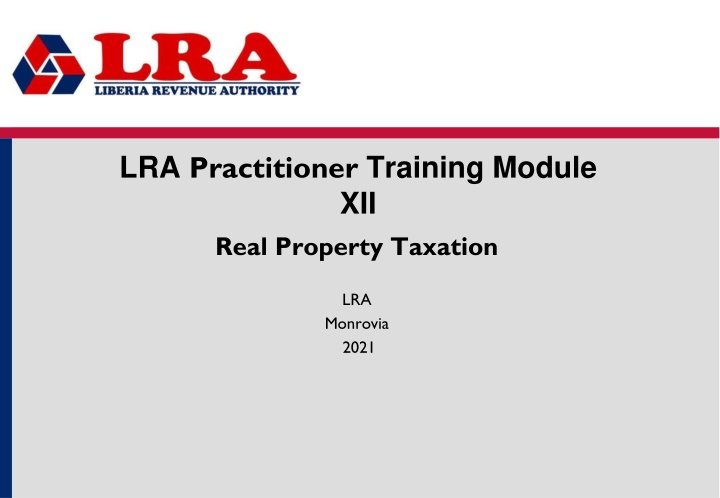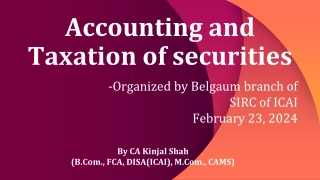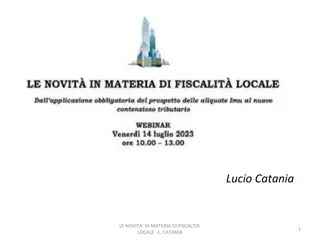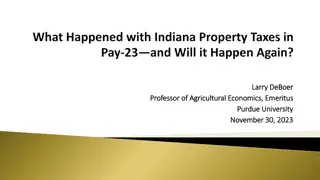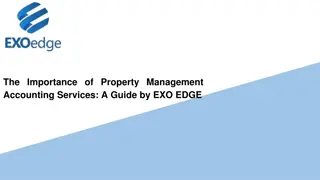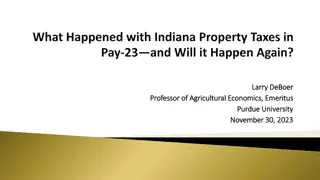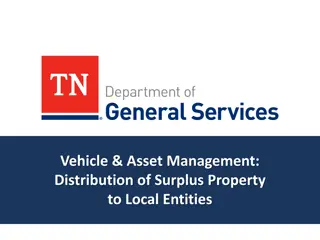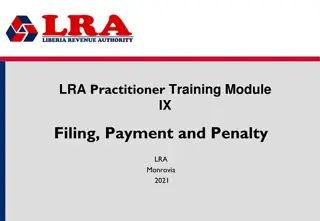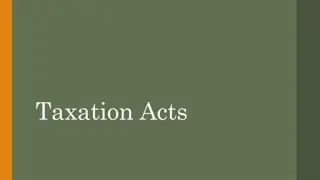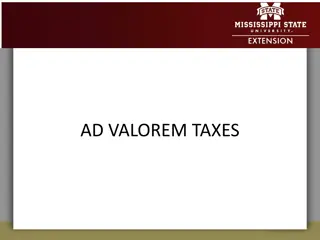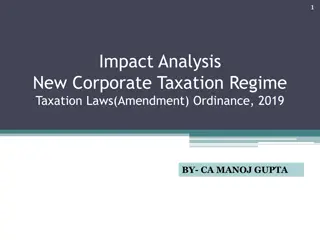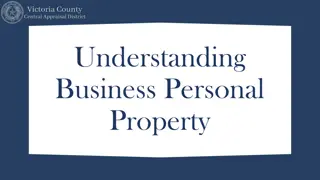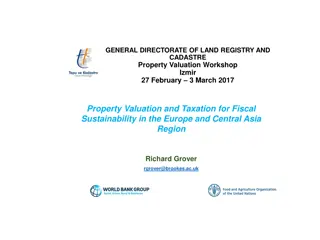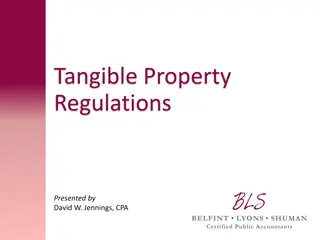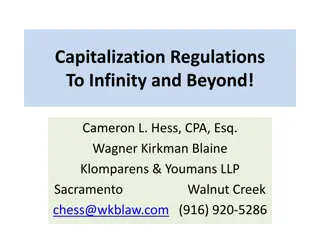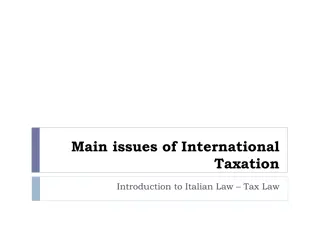Real Property Taxation Regulations in Monrovia 2021
Exploring the legal basis, filing requirements, exemptions, assessments, penalties, and procedures for Real Property Taxation in Monrovia in 2021. The content covers detailed information on tax obligations, assessment processes, exemptions for certain properties, and the implications of non-compliance.
Download Presentation

Please find below an Image/Link to download the presentation.
The content on the website is provided AS IS for your information and personal use only. It may not be sold, licensed, or shared on other websites without obtaining consent from the author.If you encounter any issues during the download, it is possible that the publisher has removed the file from their server.
You are allowed to download the files provided on this website for personal or commercial use, subject to the condition that they are used lawfully. All files are the property of their respective owners.
The content on the website is provided AS IS for your information and personal use only. It may not be sold, licensed, or shared on other websites without obtaining consent from the author.
E N D
Presentation Transcript
LRA Practitioner Training Module XII Real Property Taxation LRA Monrovia 2021
CONTENTS 1. Legal Basis 2. Filing 3. Exempt 4. Payment 5. Penalties 6. Interest 7. Records (Slide 4) (Slides 5-6) (Slides 7-8) (Slides 9-10) (Slides 11-16) (Slides 17-20) (Slide 21) 2
CONTENTS 8. Assessments 9. Re-assessment 10. Depreciation 11. Notice 12. Determination 13. Closure 14. Lien 15. Seizure and Sale (Slides 17-21) (Slide 22) (Slide 23) (Slides 24-25) (Slide 26) (Slide 27) (Slide 28) (Slide 29) 3
1.1 Legal Basis: Taxation Every person is obliged to pay the taxes for which the person is liable. No one may be required to pay taxes that are not provided for by the Liberia Revenue Code.
2.1 Filing: Real Property tax requirement Real Property tax covers the period from January 1st to and including December 31st of each year and it is paid once a year. Tax on Real Property is levied annually and imposed upon each parcel of land not exempt from taxation at a stated percentage rate prescribed depending upon its geographical classification for unimproved land.. Tax on Real Property is levied annually and imposed upon each parcel of land not exempt from taxation at a stated percentage rate of its assessed value depending upon the use classification of the building and other improvements thereon for improved land.
2.2 Filing: Real Property tax requirement & due date Real property owners are required to obtain a Tax Identification Number ( TIN ) and in no case may a resident obtain more than one TIN. No taxpayer is charged a fee for obtaining a TIN. Real property owners are required to submit schedule of property after the acquisition of the property. Schedule of property for the purpose of real property tax must be submitted within 30 days after the acquisition of the property.
3.1 Exempt: Properties Exempt from Real Property Taxes All public land, buildings and other improvements owned by the Government of Liberia; Properties owned by churches, religious societies, and foreign and domestic missions, educational institutions, charitable organizations, and fraternal organizations; provided that the property is used for religious, educational, charitable, or fraternal purposes and not for profit; and provided further that the property is not rented or leased except to another organization whose property is exempt from real property taxes; All properties held by the University of Liberia;
3.2 Exempt: Properties Exempt from Real Property Taxes All properties of foreign governments on lands leased from or deeded by the Republic of Liberia; All property which is exempt from real property tax under the terms of statutes, treaties or agreements passed or entered into by the Government of the Republic of Liberia, provided that the property is held and used in accordance with any conditions contained in such statutes, treaties or agreements.
4.1 Payment: Payment of tax & due date A tax payment is considered to have been made in a timely manner if it is received within the due date. Due date for the payment of tax is as follow: Real Estate tax January 1 to July 1st Tax payment is due no later than 5:00 p.m. on the due date of each tax return.
4.2 Payment: Extension of time to pay tax A taxpayer can apply in writing for an extension of time to make tax payments. Upon application in writing by a taxpayer required to make a tax payment, the Commissioner General may, where good cause is shown, extend the period within which a tax payment can be made and may impose requirements appropriate to ensure the payment of the tax due. The extension alter the due date for payment of tax, he/she will be required to pay the interest on delayed tax payments.
5.1 Penalties: General introduction Taxpayers are subject to penalties if they do not pay the correct tax liability within due date. Financial penalties/fines for tax offences are imposed by the tax administration. Criminal prosecutors/courts. penalties are generally imposed by public Penalties are levied to encourage taxpayers to comply with their tax obligations in an accurate and timely manner. Penalties are not intended to generate revenue but to discourage non-compliance.
5.2 Penalties: Penalties under the LRC Penalty is levied on failure to pay correct tax liability within due date. It serves as a deterrent to any non-compliance for tax liability payment within due date. It encourages timely payment on tax liability within due date and avoids huge arrears.
5.3 Penalties: Late payment of tax amount A taxpayer is subject to late penalty of 5% each month if correct tax payment is not made within the required due date, on or before July 31st of the year in which it is levied. Late penalty of 5% each month is imposed commencing on August 1st of the year in which it is levied. For each additional month that the delay continues, an additional 5% penalty is imposed on the unpaid remain tax amount. The total penalty is not permitted to exceed 25% in the aggregate tax amount.
5.4 Penalties: Calculation of penalty for failure to pay Let us suppose that XYZ failed to pay its Real Property tax amount of US$300.00 for the period January 1st to July 31st 2021 on time and pays on September 1, 2021. In this case, it will be subject to a penalty due to failure to pay (on or before July 31st ) at the rate of 5% of tax liability each month as follows. Taxpayer: XYZ Tax amount: US$300.00 Due date for payment: July 1st Tax paid on: September1, 2021 Late penalty: 5% of tax amount for each month Penalty is calculated as follow: Tax amount x Penalty Rate x Number of Months US$300.00 x 0.05 = US$15.00 or US$300.00 x 0.25 x 1/5 = US$15.00 Tax amount Penalty 5% (for August) Total due US$300.00 US$ 15.00 US$315.00
6.3 Interest: Late payment of tax amount A taxpayer is subject to interest charged if correct tax payment is not made within the required due date, on or before July 1st of the year in which it is levied. Interest is imposed commencing on July 2nd of the year in which it is levied. Interest is calculated on each successive month on the unpaid tax amount.
6.4 Interest: Calculation of interest for failure to pay Let us suppose that "ABC failed to pay its Real Property tax amount of US$300.00 from January 1st to July 1st on time and pays on August 2, 2021. In the case where the market rate as published by the Central Bank of Liberia during this period was 15.35%. Taxpayer: ABC Tax amount: US$300.00 Due date for payment: July 1st Tax paid on: August 2, 2021 Interest charged: 15.35% of tax amount for each successive month Interest is calculated as follow: Tax amount x 15.35% x Number of Months US$300.00 x 0.1535 x 1/12 = US$3.84 Tax amount Interest 15.35% (from July 2 August 1) US$ 3.84 Total due US$300.00 US$303.84
11.1 Assessments: Tax Payable An assessment of tax payable by a person with Real Property is done by the following means: By Self-assessment: In the form of the taxpayer s statement of tax due for a tax year. The taxpayer declares the value of his/her property, through self-declaration, subject to taxation on the basis of valuation, whether improved or unimproved. By Appraisal of Certified Tax Firm: In the form of the taxpayer s statement of tax due for a tax year. The taxpayer declares the value of his/her property, through a certified tax appraisal firm, subject to taxation on the basis of valuation, whether improved or unimproved.
11.2 Assessments: Jeopardy If the Commissioner General has reasonable grounds to believe payment of tax is in jeopardy or at risk, he shall provide by making a jeopardy assessment in order to ensure compliance.
11.3 Assessments: Real Property Assessment at Market Value on Inspection Each parcel of land, subject to assessment and taxation, shall be inspected and its assessed value determined on the basis of its market value as at the date of inspection. Such assessed value shall be carried on the real property assessment record books kept by the Commissioner General for a period of 5 years from the date such valuation becomes operative in accordance with the following: Determination on or before June 15th . When the assessed value of a parcel of land is determined hereunder and notice thereof is given to the taxpayer on or before June 15th in any calendar year, the operative date shall be January 1st of the then current calendar year. Determination after June 15th . When the assessed value of a parcel of land is determined hereunder and notice thereof is given to the taxpayer after June 15th in any calendar year, the operative date shall be January 1st of the succeeding calendar year.
11.4 Assessments: Real Property Assessment at Market Value on Inspection Exception when newly completed structures are involved. When newly constructed improvements on a parcel of land are completed, either fully, or to the extent that the new construction is being used or can be used for the purpose for which it was constructed, a determination shall be made of the assessed value of the parcel on the basis of its market value as at the date of inspection. In the event the assessed value becomes operative on or after February 1st in any calendar year, the appropriate real property tax shall be levied on the parcel involved for the remainder of the calendar year at the rate of one-twelfth of the annual tax based on such assessed value for each month or fraction of a month of the then current calendar year remaining, and the assessed value shall be carried on the real property assessment books for a period of 5 years from January 1st of the succeeding calendar year.
11.5 Assessments: Real Property Assessment at Market Value on Inspection In the event such construction is completed and the assessed value becomes operative on or before January 31st in any calendar year, then the real property tax to be levied on such parcel for such calendar year shall be the whole of the annual tax based on the assessed value and the assessed value shall be carried on the real property assessment books for a period of 5 years from January 1st of the then current calendar year.
12.1 Reassessment: Real Property Reassessment of 5-Year Term at Market Value Prior to the termination of any 5 year term during which the assessed value of a parcel of land, based upon market value, is carried on the real property assessment record books, a re-inspection of such parcel shall be made and a re-assessment of its assessed value shall be determined upon the basis of its then market value. The assessed value so determined upon such re-assessment shall be carried on the real property assessment record books for an additional 5 year term when notice thereof is given to the taxpayer on or before June 15th of the succeeding calendar year. If no re-assessment of the assessed value of the parcel of land is so determined, then the prior assessed value shall continue as the basis for the levying of the annual rental property tax thereon, except that a taxpayer, on or before June 15th of any year subsequent to the termination of any 5 year term, may serve and file an administrative appeal requesting a review of the assessed value of the parcel. A re-assessment of the assessed value of a parcel of land based on its market value may be made by the Commissioner General at any given time subsequent to the termination of any 5 year term.
13.1 Depreciation: Determination of Depreciation for Real Property The determination of depreciation for real property is the use of the Economic Age-Life Method for straight-line depreciation. The Economic Age-Life of a building, as per regulation, is 50 years. The Effective Age, the period in which an asset is depreciated, as per regulation, is 15 years. To determine the depreciation rate of the building or property can attract over 15 years is defined by the ratio of effective age to total economic life. That is, Depreciation Rate = Effective Age/Total Economic Life 15 years/50 years = 30% The 30% represents a total depreciation rate of a building or property can attract over 15 years. This means 30% rate is to be spread over a 15 year period such that the annual depreciation rate becomes 2%, which is 30%/15 years. This indicates that the Effective Age of the building is 30% of its Economic Life That is, Effective Age of the building = 0.30 x 50 years = 15 years
14.1 Notice: Property Tax Bills (Assessment Notice) Real Property Tax Notice - a notification to taxpayer on the amount of annual tax levied as a result of an assessment. The Notice provides the following information: Property Identification Number (PIN) a number assigned to each property to identify it for assessment and taxation purposes. It is located in the upper left portion of the Assessment and Tax Notice. Owner of property the persons who owns the property. Location of property Clear description of where the property is located Issue date of the Notice the date the Notice is issued. Current valuation is the current assessed true value of the property.
14.2 Notice: Property Tax Bills (Assessment Notice) Applicable tax rate is the rate applied on an assessed value and payable as property tax. Tax for the year an assessment of real property at its real and true value. Arrears an arrears due is an unpaid taxes and/or interest and penalty from previous years. Balance due the current taxes due and payable including tax arrears. Tax Statements an advice issue to inform taxpayer that payment is past due.
15.1 Determination: Notice of Determination All determinations or decisions made by the Commissioner General is subject to procedures. When a notice of determination is issued to taxpayer for tax due for a tax period including penalty and interest, that determination becomes final, 30 days after the date of the notice of determination. The date of the notice of determination is determined from the date that it is delivered in person to the taxpayer (or the taxpayer s agent), or the date it is sent (by an approved delivery services such as DHL, EMS and any other services designated.
16.1 Closure: Temporary Closure of Business When a taxpayer fails to pay tax on the due date and, after receiving a 72-hour warning notice, fails to contact the LRA to make arrangements for payment, or for the purpose of spot audit, or is unable upon request to present books and records for inspection as required, the Commissioner General may lock and seal the person s place of business and keep it closed for not more than 5 days for the purpose of examination of taxpayer records, audit, and provision of advice to the taxpayer concerning compliance with tax obligations; and the decision of the Commissioner General to do so is a determination and subject to the emergency hearing procedure for taxpayer protest.
17.1 Lien: Lien for Taxes If the tax debtor fails to pay tax that is due and payable as stated in an assessment notice, a tax lien is created in favor of the Government of Liberia upon the property of a tax debtor. For a lien to be created/perfected, the Commissioner General must served the tax debtor with a notice in writing specifying the tax debtor, the tax debtor s tax identification number, the property subject to the lien, the extent of the lien (the principal amount of the tax due plus interest accruing and any other costs of lien and sale), the tax to which the lien relates, details regarding the Commissioner General power to sell property subject to the lien, and a statement of the taxpayer s rights. The lien must be effected, in the case of land and buildings, the Commissioner General files an application to register the lien by applying to the court of proper jurisdiction and wherein the court shall, without fee, register the lien referred to on the title of the land or buildings.
18.1 Seizure & Sale: Seizure and Sale of Assets The Commissioner General may notify a tax debtor (owner of property/person in custody of the property) in writing of the Commissioner General s intention to seize and sell property held by the debtor including proposed method and timing of sale; and for tangible property, the manner and place in which the Commissioner General intends to take possession of the property, which is subject to a tax lien. The Commissioner General may place the notice on the owner s business premises; or if the Commissioner General does not have sufficient information to identify the person on whom the notice should be served, the Commissioner General may published the notice in a local daily newspaper (within two days of seizure) identifying the items seized and stating the location at which seizure was made. The Commissioner General may take possession of the tangible property referred to in the notice after it is served and may sell the property by public auction or in such manner as appropriate.
